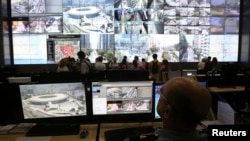RIO DE JANEIRO —
Soccer hooligans beware. Brazil's soccer capital is creating a special police unit to thwart any trouble on the streets during this year's World Cup soccer tournament and prevent a repeat of last year's violent protests.
Rio de Janeiro state officials say the 500-man unit trained in crowd control will be deployed in Brazil's second-largest city, playing host to the most games, including the World Cup final at the legendary Maracana Stadium on July 13.
Brazil was rocked by an unexpected outburst of protests last June during the Confederations Cup soccer tournament, a tune-up event for the World Cup. About a million Brazilians took to the streets of the country's largest cities to vent their frustration with corrupt government, high taxes and bad public services.
The demonstrations dragged on for weeks, but lost momentum when they deteriorated into violent clashes between police and anarchic youths.
Given the high visibility of the World Cup, which is watched by billions of people worldwide, a new wave of protests is inevitable, according to Rio state's security chief for big events, Roberto Alzir.
This time, however, Rio plans to be ready to handle protests with a specialized force to avoid the heavy-handed repression unleashed last year by military police members more accustomed to shootouts with drug traffickers in the city's slums than dealing with middle-class demonstrators.
"We won't make the same mistake again," said Alzir. "The demonstrations were so intense and lasted so long that we had to call up all the city's police force and we put in the frontline personnel that were not used to such delicate situations.''
The new unit will be specially trained and equipped to control crowds during the World Cup and the Olympic Games that Rio will host in 2016.
"That's how we will avoid abuses. The better the equipment and training, the less force that will be needed," said Alzir.
Rio de Janeiro state officials say the 500-man unit trained in crowd control will be deployed in Brazil's second-largest city, playing host to the most games, including the World Cup final at the legendary Maracana Stadium on July 13.
Brazil was rocked by an unexpected outburst of protests last June during the Confederations Cup soccer tournament, a tune-up event for the World Cup. About a million Brazilians took to the streets of the country's largest cities to vent their frustration with corrupt government, high taxes and bad public services.
The demonstrations dragged on for weeks, but lost momentum when they deteriorated into violent clashes between police and anarchic youths.
Given the high visibility of the World Cup, which is watched by billions of people worldwide, a new wave of protests is inevitable, according to Rio state's security chief for big events, Roberto Alzir.
This time, however, Rio plans to be ready to handle protests with a specialized force to avoid the heavy-handed repression unleashed last year by military police members more accustomed to shootouts with drug traffickers in the city's slums than dealing with middle-class demonstrators.
"We won't make the same mistake again," said Alzir. "The demonstrations were so intense and lasted so long that we had to call up all the city's police force and we put in the frontline personnel that were not used to such delicate situations.''
The new unit will be specially trained and equipped to control crowds during the World Cup and the Olympic Games that Rio will host in 2016.
"That's how we will avoid abuses. The better the equipment and training, the less force that will be needed," said Alzir.





